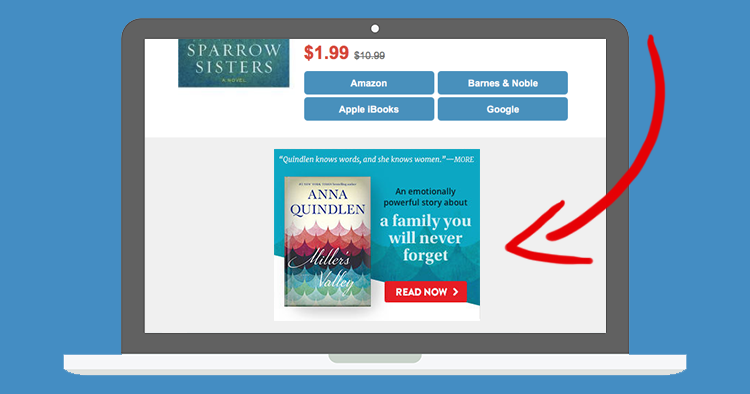
Today’s guest post is by author Anne Janzer (@AnneJanzer) author of Writing to Be Understood.
Of all the tools available to authors to promote their books, advertising may be the most challenging.
It seems so appealing: set up a campaign and watch the money roll in. It rarely works like that. Advertising is tricky. Many authors have blown their budgets on print or online ads with little to show for it.
While advertising helps you reach people beyond your immediate sphere of influence, the key is to use it strategically. Advertising should support your book marketing strategy, not replace it.
Many authors use Facebook and Amazon to advertise their books. If you’ve tried these platforms without success or hesitate to spend the money, consider experimenting with BookBub ads.
About BookBub Ads
First, don’t confuse BookBub ads with BookBub Featured Deals. These are different things.
BookBub Featured Deals are book promotions sent by email to the service’s many subscribers. You have to apply for them ahead of time, discount the book steeply, and pay a hefty fee. The price tag and selectivity put Featured Deals beyond the reach of many authors.
BookBub ads, in contrast, are more egalitarian. You can run them at any time. The ads appear at the bottom of the Featured Deal emails. Even in this less-compelling territory, they generate clicks and sales.
To learn how BookBub ads work, check out the BookBub tutorial. Author David Gaughran has a book coming out shortly on the topic, so check that out as well. (Here are his thorough posts on BookBub.)
Why I Love BookBub Ads
BookBub gives you a high degree of control over your ads. You can specify:
- When your ads appear: If you set up your campaigns correctly, BookBub will show them (unlike those tetchy Amazon Marketing Services ads).
- Which readers will see the ads: You can target people who follow specific authors.
- How much you spend: Determine your budget and whether to pay per click (each time someone clicks on your ad) or per impression (based on how many times BookBub displays the ad).
- Which platforms and geographies see the ad: Want to reach people in Canada who read on Kobo? Apple Books readers in Australia? You can do that.
They’re flexible. For that reason, BookBub ads can serve several roles in your marketing plans.
Support a Book Launch
Unless you’re a celebrity, getting attention for your new release is challenging. Book tours and signings are costly and impractical. Try a burst of BookBub ads instead, using the platform’s author-targeting capabilities to put the book in front of readers who might enjoy it.
BookBub subscribers love a deal—that’s why they subscribe. You don’t have to discount your books to run ads. But if you’re doing a concentrated, short-term campaign, a lowered price drives sales.
For the release of my most recent book, Writing to Be Understood, I discounted the ebook to $2.99, then ran a week-long BookBub ad campaign to send readers to Amazon. (I focused on Amazon for the initial launch week.) Multiple versions of the ad targeted readers of various nonfiction authors.
With an investment of about $200, this campaign met my two main objectives:
- It sold many books, briefly propelling the book to #1 in a competitive category. The Best Seller label offered important “social proof” for a new book.
- It populated the early sales data for the book with the right kinds of readers. (You can see clues into the sales data in the Amazon page section labeled “Customers who bought this item also bought…”)
I didn’t rely on ads alone; I also sent emails and did other launch activities. But the ads definitely found buyers. Because sales remained elevated after the campaign ended, the advertising soon paid for itself in royalties. (Sometimes you have to be patient to see a return on your investment.)
Genre matters. I’ve run a similar advertising campaign for a friend with a memoir that had been published for a year but wasn’t selling. Again, BookBub delivered results. Your mileage may vary; success can be tougher in competitive genres.
To support your launch:
- Decide on a budget, knowing that you may earn much of it back in royalties over time
- Consider a short-term discounted price
- Test a few combinations of ad copy and images
- Create multiple campaigns targeting possible “also-bought” authors. (Hint: it costs less to advertise to fans of less well-known authors than the big names.)
- Watch the campaigns, learn what works, and adapt as needed, shifting budget to the best-performing campaigns.
Target Specific Geographies or Platforms
Say that you’re giving a talk in the UK next month. You’d like to increase the visibility of your book on Amazon UK ahead of the event.
Many of Amazon’s international platforms are less competitive than Amazon.com. A well-timed BookBub ad blast (using pay-per-impression ads) could make your book a bestseller on the international site before your appearance.
Perhaps your book is set in Australia. Consider creating an ad that highlights the location and putting it in front of readers in that market. You might run a longer-running, pay-per-click campaign that generates enough sales to pay for itself in royalties.
Support Your “Wide” Ebook Sales
BookBub lets you reach readers on ebook platforms beyond Kindle. You can advertise to people who read on Apple Books, Kobo, Google Play, or Nook. See which platforms offer the best sales results for you.
Experiment and Test
A quick trial costing $10 or $20 can deliver valuable data about which messages resonate or which authors’ fans click on your ads. Use insight from these test campaigns to inform your other marketing strategies. For example, if you find that Canadian readers click through more often than people in other markets, consider reaching out to libraries or bookstores there.
If you approach it with an open mind and a well-identified strategy, BookBub advertising can be a valuable addition to your book marketing skills.
Have you tried BookBub Ads? What was your experience? Let us know in the comments.

Anne Janzer is an author, nonfiction book coach and unabashed writing geek. Her writing books include The Writer’s Process, Writing to Be Understood, Get the Word Out: Write a Book That Makes a Difference, and The Writer’s Voice: Techniques for Tuning your Tone and Style . Today, Anne works with business writers and nonfiction authors to communicate their ideas more effectively. Find her work at annejanzer.com.

My limited experience with BookBub ads was generally positive – great user interface, transparency, easy to set up, manage, etc.! My sense is that BookBub works better for fiction vs. nonfiction books. I couldn’t target by author because the authors I was trying to target (bestsellers in my category) didn’t have sufficient traffic to make that feature work. This left me stuck with the only option of targeting by broad categories. Still used it effectively (and relatively cheaply) to do some quick A/B ad testing and would definitely do so again.
You’re right, Alexis – BookBub is definitely more of a fiction playground. Nonfiction writers either have to think creatively about the target authors or put together a large conglomeration of midlist authors. (Looking in your Amazon “Also Bought” data is one source of inspiration.) Even then, the ads won’t run for long before you exhaust the limited audience. As you said, A/B testing messages is another great use for BookBub ads.
Interestingly, as someone who is signed up for BookBub’s reader emails, just this fall I started getting Featured Deals for prescriptive nonfiction books. (I’ve indicated zero interest in fiction, so I don’t receive those.)
The emails don’t come that often, but the selections are decent. Feels like they may be trying to beef up this area of their business.
It looks like it. The Featured Deal pricing table (https://www.bookbub.com/partners/pricing) lists the number of subscribers for each category, offering some good insight into the platform. While the big fiction categories have the most interested subscribers, “Advice and How-to” has more than a million in the US. Not bad at all.
Good post! I find BB ads by far the most effective (historical fiction) of all ad platforms. Targeting options are good, the response time is great (~4 hours), and with a $10 spend I quickly see what’s working or not. Which reminds me… I need to get my Solstice ad ready 😉
Thanks for that input, Harald — good to know that it’s effective for historical fiction. And ooh, a Solstice ad! Interesting angle.
The Solstice? Absolutely. I center my life on the two solstices. Just like in historic/ancient times. Sadly, most have lost touch with that natural cycle.
Anne, thank you for your informative article. Two questions: what exactly is the difference between pay per click and per impression? Which one would you recommend for a fiction thriller?
With pay per click, you pay only when someone clicks on your ad – so the spending is more controlled. If you figure that it takes 10 clicks to convert one sale, and you pay 15 cents per click, then you’ll spend $1.50 for each sale. (These numbers only work out over lots of impressions.) Pay per impression – you bid something for each thousand impressions. Which one to use depends on how you’re using the ad less than your genre. For example, I like to use Pay Per Impression for short ad campaigns (because BookBub WILL spend your budget) to support book launches or promotions. Once an ad has a few thousand impressions, you’ll know if it works or not, and can use that image and targeting for a continuing pay-per-click campaign.
Thank you! I just signed up for a week’s promotion of my book on Smashwords, so I will try the pay per impression to start. Happy Holidays!
Great, Idelle – just pay attention to how the ad is doing and don’t be afraid to tinker with the image or the words. (Approach it with a sense of curiosity, if possible!)
I haven’t had any luck at all with them… but that being said, I have a really hard time knowing what keywords to use. For genre, it only fit into 3 categories (I write romance). And for authors… I really really have a hard time figuring out what authors to use! I started with my own personal favorites, but aside from that, I just feel lost.
I’m also trying a new, professionally made banner, so I’m hoping that helps. I’d given up on BB, but after reading this article, I’m giving it another shot.
Allie- It can take some experimentation. You might have success targeting romance authors who aren’t the “big names” on BookBub. Look in your own book’s “Also bought” data (if there is one) for inspiration. Think small, experiment, and see if you can get something going that works. Good luck!
My thriller/ suspense novel, Searching for Pilar, was a featured book on Book Bub in July. The price was reduced from $8.99 to $.99. I sold around 1700 ebooks as a result of the Book Bub feature. Although book sales have tone well for a first time author, the Book Bub promotion was a great experience and produced more sales than anything else I have done. I will try the ad feature. Thanks for alerting me to this tool. Patricia Hunt Holmes
Patricia – Featured Deals are wonderful, aren’t they? Ads are not as much as a slam-dunk, but they can work very well. I hope you find success with them.
[…] Marketing encompasses many different avenues. Sandra Beckwith discusses authors and book clubs, R.L. Maizes explores how to write your debut book’s acknowledgements section, Lee Foster lists 12 SEO tips to drive traffic and sell books, and Ann Janzer lays out how to use BookBub ads to support your book marketing. […]